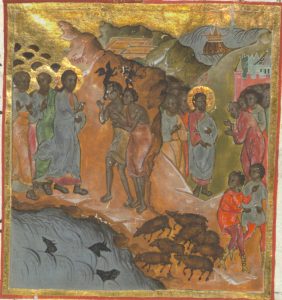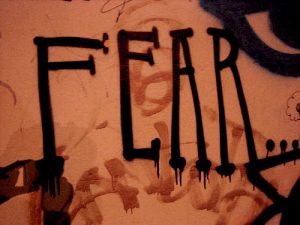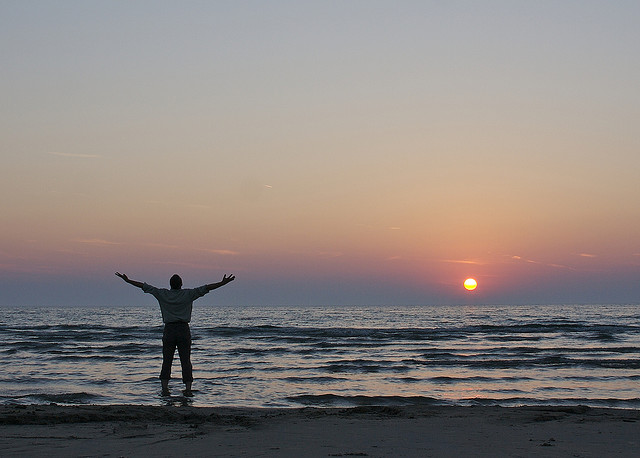Revised Common Lectionary Reflection, Proper 7 (12), Second Sunday after Pentecost, Year C
June 23, 2019
Lessons: Isaiah 65:1-9; Psalm 22:19-28; Galatians 3:23-29; Luke 8:26-39
Theme: God’s faithful and generous people understand the price of freedom and the cost of change, and they trust the Holy Spirit to guide them.
Key Scripture: Then the people came out to see what had happened, and when they came to Jesus, they found the man from whom the demons had gone sitting at the feet of Jesus, clothed and in his right mind. And they were afraid. – Luke 8:35
Preaching/Teaching Reflection
 This week’s lesson from Luke’s gospel offers both a wonderful microcosm of Jesus’ ministry and mission and a reminder of the high cost of change. I’m not talking about change just in the first century either. We humans to this day have a tough time with the concept of change in our lives, culture, and (not surprisingly) our faith communities.
This week’s lesson from Luke’s gospel offers both a wonderful microcosm of Jesus’ ministry and mission and a reminder of the high cost of change. I’m not talking about change just in the first century either. We humans to this day have a tough time with the concept of change in our lives, culture, and (not surprisingly) our faith communities.
Jesus has been working miracles, healing people, and proclaiming a new order and way of being. Now he and his disciples have crossed the Sea of Galilee to Gentile territory, something new and adventurous. I’m pretty sure those disciples were well out of their comfort zone with this development in the program. Nevertheless, here they are pulling the boat onshore the country of the Gentile Gerasenes, and no sooner do they set foot on land when they are greeted by a naked, homeless demoniac.
The unclean spirits holding this man captive are many. In fact, the spirits in the man claim the name of Legion (which means many but is also the word for a Roman military unit of more than 5,000 men). We have an image of profound captivity, as well as shades of bondage to Empire. There’s a lot more going on here than a simple healing, methinks. Jesus shows us something about the price of freedom and our own bondage in relationship to the cost of change.
First of all, we have a beautiful story of an outsider being restored to insider status. The Geresene demoniac had been excluded from his community, imprisoned when possible, and reduced to homeless wandering in the wilderness and among the tombs when he breaks free. Jesus restores the man’s dignity and position, and it frightens the good citizens of that region.
But that’s not all! Jesus honors the unclean spirits’ request to avoid returning to the abyss and allows them to enter a herd of pigs. This in turn moves the pigs to rush down a steep bank and hurl themselves into the lake where they drowned. We have freedom for the demonic, and an implicit promise of freedom for the wider community, and we have a change in commerce and culture thanks to the demise of the pigs.
These pigs are important meaning makers, too. They’re not just any old commodity. Romans loved their pork, and pork was an important military ration. Romans even used boars as “war pigs,” so the wider meaning was likely not lost on Luke’s original audience. The unclean spirits, naming themselves Legion, are permitted to enter the pigs used to feed the wheels of Empire and satisfy the voracious hungers of Empire’s citizens. The pigs then plunge themselves into the lake and drown signifying that evil and Empire will not triumph in Jesus’ way.
Even so, the people who see this miracle, the demoniac restored to his right place in the social order, are motivated by fear. They don’t want to change and are afraid of what this new  thing would mean for them, their livelihoods, traditions, and future. They ask Jesus to leave. The former demoniac wants to go with Jesus, but Jesus gives him another assignment—to stay among his people as a witness to God’s actions.
thing would mean for them, their livelihoods, traditions, and future. They ask Jesus to leave. The former demoniac wants to go with Jesus, but Jesus gives him another assignment—to stay among his people as a witness to God’s actions.
Yes, there is a price for freedom. We may be asked to do something other than what we want or envision. The Spirit may call us to new things in unusual places among people we don’t intend. And yes, there is a cost to change. Change is necessary and will happen with or without our participation. Change calls us to lay down our wills, to leave behind the illusions of our security, to exchange the supposed safety of our traditions and ways of living and enter into the costly freedom that we cannot see in future tense, must experience in present tense, and come to understand in past tense. Most of what stands between us and freedom is fear. The question for us as individual disciples and as communities of faith is this: Are we willing to be freed and open to change? We must be willing lose some (or maybe even all) of what we know in order to gain everything. I pray that we are willing to open our hands, hearts, and minds to let it go.
In Worship
This Sunday we begin what’s known as Ordinary Time in the church year. This long “green season” features a series of stories about Jesus’ life, in Year C from Luke’s gospel. This season reminds us, too, that the life of discipleship is about staying the course, about growing, persevering, and equipping. It’s not all festivals and pomp.
Make that connection today in worship and invite people into this season by comparing it to the season outside your walls. Here in North America we are in the growing season. Not all of us are experiencing it the same way. Flooding and severe weather is preventing the orderly progression of planting and growth in the Midwest. It’s a wet and fertile season here in the Northeast. Likewise, our faith growth is not always the same; there is an unpredictable element to the work of the Spirit, as well as to the challenges we face from the forces of Empire and evil existing in our world.
Consider hymns with a growth theme. Consider a commissioning/sending into a season of growth and spiritual development. Invite congregants to savor the natural world around them and to watch how growth takes place in all God’s creatures and creation.
With Youth
This week spend some time with the lesson from Galatians and Paul’s words “There is no longer Jew or Greek, there is no longer slave or free, there is no longer male or female; for all of you are one in Christ Jesus.”
Invite youth to ponder their understanding of this truth in our time. How are we living into our “oneness in Christ Jesus”? Are we successful? Who is being left behind? Who is being denied a seat at the table? What do the youth most wish the adults in their lives to know and respond? If possible, open the doors to a conversation about racism and bias. Check out the work of Teaching Tolerance for some good ideas and resources.
With Children
This week’s focus verse is Galatians 3:26 – …for in Christ Jesus you are all children of God through faith.
Have on hand some family pictures that include you and any siblings or cousins as children. Also have on hand the church photo directory if you have one. If you do not have a photo directory try to get several people in the congregation to let you borrow photos of them as children.
Show the children your family photos. Point out your parent(s), siblings and/or cousins. Talk about how you are related and who your parents are. Ask the children if they have siblings or cousins. Ask them to point out parents and grandparents who are with them in worship. Talk a little about what it means to be a family—both the good and the difficult things.
Next bring out the church directory and tell the children that everyone in this directory is your brother or sister—and theirs, too. Share the focus verse with them, and tell them that in our baptism we are adopted into God’s family through Jesus. We gain an enormous family not only in our own congregation but around the world and across time. Talk next about what it means to be part of God’s family, where everyone is welcome and has a place at the table. And yes, there are both good and difficult aspects to being God’s family. We don’t do it perfectly at all, but God still loves us and forgives us when we mess up.
Finish with a simple prayer thanking God for the gift of our human family and for the gift of our faith family. Bless the children and send them out to remember that God desires EVERYONE to be a part of the family.
Weekly Stewardship Bulletin Insert
Freedom comes with a price, and there is a cost to change. We know this as faithful stewards of God’s abundance, and even when it is difficult we must try to lean into change that will help us (and everyone) move toward freedom in Christ.
Stewardship at Home
Fear prevents so much growth and possibility! When we look around we can see the effects of fear all over the place. Fear has contributed to polarization both politically and socially, to alienation and bias, and to racism and xenophobia. Fear of the other (whatever category we class as “other”) prevents freedom and growth for all of us—not just those whom we fear.
This week take an honest look at what you fear and who you fear? What is the root of that fear? How likely is that fear to become reality? How might being open to change help you move beyond fear?
2016 Reflection: https://www.stewardshipoflife.org/2016/06/stewards-of-faith-in-troubling-time/
2013 Reflection: https://www.stewardshipoflife.org/2013/06/many-are-the-demons/
2010 Reflection: https://www.stewardshipoflife.org/2010/06/what-are-you-doing-here-insert-your-name/
Photos: spaceamoeba; Luke the Cypriot (active 1583-1625). Jesus, the Gerasene, and the Unclean Spirits, from Art in the Christian Tradition; and Wilderdom. Creative Commons usage license. Thanks!
Note: Reprint rights granted to congregations and other church organizations for local, nonprofit use. Just include this note: “Copyright (c) 2019, Rev. Sharron Blezard. Used by Permission.” Other uses, please inquire: thewritelife@hotmail.com.




Leave a Reply